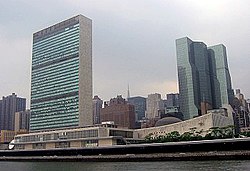 | |
 | |
| Abbreviation | DPPA |
|---|---|
| Formation | 1992 |
| Type | Department of the Secretariat |
| Legal status | Active |
Head | Under-Secretary-General for Political and Peacebuilding Affairs – Rosemary DiCarlo |
Parent organization | United Nations Secretariat |
| Website | dppa.un.org/en |

| This article is part of a series about the |
| United Nations |
|---|
 |
| Charter |
| UN System |
| Funds, programmes, and other bodies |
| Specialized agencies |
| Membership |
| History |
| Resolutions |
The United Nations Department of Political and Peacebuilding Affairs (DPPA) is a department of the Secretariat of the United Nations (UN) with responsibility for monitoring and assessing global political developments and advising and assisting the UN secretary-general and his envoys in the peaceful prevention and resolution of conflict around the world. The department manages field-based political missions in Africa, Central Asia, and the Middle East, and has been increasing its professional capacities in conflict mediation and preventive diplomacy. DPPA also oversees UN electoral assistance to Member States of the organization. Established in 1992, the department's responsibilities also include providing secretariat support to the UN Security Council and two standing committees created by the General Assembly concerning the Rights of the Palestinian People and Decolonization. DPPA is based at the UN headquarters in New York City.